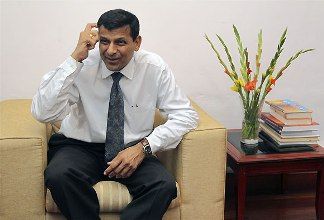 Borrowing to pay for expenditure is never sensible, but borrowing from the heartless global market is the diametric opposite of prudence, rues Jamal Mecklai
Borrowing to pay for expenditure is never sensible, but borrowing from the heartless global market is the diametric opposite of prudence, rues Jamal Mecklai
Back in the 1960s, John Lennon and Paul McCartney sang:
Dear Prudence, won’t you come out to play?
Dear Prudence, greet the brand new day
The sun is up, the sky is blue
It’s beautiful and so are you
Dear Prudence, won’t you come out to play?
And since it was the 1960s, you can imagine the discipline and foresight that dear Prudence had to exercise to stay out of trouble, as they so euphemistically said in those days.
Score one for Duvvuri Subbarao, the Reserve Bank of India’s former governor, who prudently resisted the exquisitely lyrical chorus -- I was kicking in, as well, at the back of the chorus line -- to increase the foreign institutional investor limit for debt, even as, in 2012, it got louder and more demanding when India’s current account problems became more and more apparent.
If we could just get the total debt inflow up to where Indian debt was included in the global debt indices, the inflows would be sticky and our current account deficit financing problems would be solved, went one persuasive argument.
Yeah, said dear Prudence, let’s wait and watch.
Like his predecessor, Y V Reddy, the dadaji of prudence, he understood that looking for ways to fund a bottomless pit -- which is what our current account deficit is/would be as long as Prudence’s idiot brothers in Delhi didn’t 'see the light' -- is bound to end in tears.
Borrowing to pay for expenditure is never sensible, but borrowing from the heartless global market is the diametric opposite of prudence, who held her knees tightly clenched despite the sometimes charming enticements.
As a result of this good sense, the total amount of foreign institutional investors' debt in Indian markets as of January 1, 2013, was only about $33 billion, a tad over 20 per cent of total FII investment in Indian markets.
And it has paid off handsomely, as we see today with global market increasingly uncertain.
The first sign of this was back in May last year, when the US Federal Reserve hinted at the end of quantitative easing.
From May 22 to September 4, more than $10 billion of debt investments flew out of India and the rupee fell by 24 per cent, turning in the worst performance of emerging market currencies (the Turkish lira, the Brazilian real and the Indonesian rupiah all fell between 10 and 15 per cent, while the South African rand dropped by eight per cent during the same period).
By this time, Raghuram Rajan had ridden in on his white horse, flashing the double-edged Excalibur of the oil swap and special FCNR(B) windows.
He is, rightfully, being hailed as a saviour -- people have not yet started making pilgrimages to his birthplace, but it’s an idea for tour operators.
Despite his efforts, however, as well as the government’s import duties on gold aimed at containing the current account deficit, another $3 billion fled the debt investment bucket by the end of the year, bringing total FII debt holdings to less than $20 billion.
It is important to understand that debt investors are a conservative lot and, in general, most such investments are hedged out of foreign exchange risk to simply earn an arbitrage profit, rather than carry the risk to possibly increase their yield.
Thus, it is extremely likely that most of this remaining amount (about 35 per cent of the total investment) was already hedged out of rupees.
This then would explain why the rupee has -- surprisingly to many -- been holding itself together quite well in the recent bout of emerging market nervousness, which was triggered when the Argentine peso collapsed on January 20. All the usual suspects immediately headed for the cellar -- the Turkish lira fell by five per cent in a week; the Brazilian real lost nearly four per cent; South Africa and Russia over three per cent each.
The rupee did fall, to be sure, but less than the others and, importantly, there was very little panic in the market.
Indeed, since January, there has been a net inflow of about $2 billion into the debt market and the rupee has strengthened by eight per cent, while most other emerging market currencies have fallen deeper into the abyss -- the lira by a further 12 per cent, the rand 10 per cent, the rupiah eight per cent, the ruble seven per cent and the real by four per cent.
Recent trade statistics make it clear that the current account deficit will come in at a quite comfortable two per cent of gross domestic product this year, although its sustainability remains a question, since even with sons of Prudence in charge at Mint Street, the idiot brothers and some strange but interesting cousins are raising hell in Delhi.
To keep things in perspective as we begin to explore the new world, I believe that (with a wink and a nod to Messrs Lennon/McCartney) a tip of the hat -- unfortunately neither of them is a drinker -- to both Drs Reddy and Subbarao is in order.
Image: Raghuram Rajan; Photograph: Reuters












 © 2025
© 2025